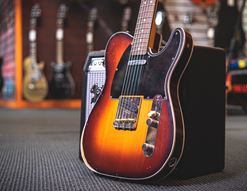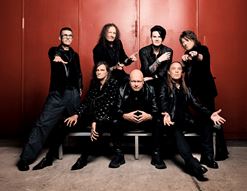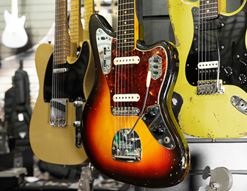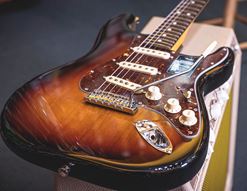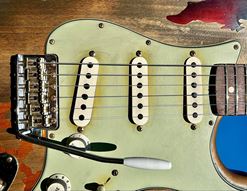Whilst rock music definitely comes from the Blues (and thus initially from Africa), it’s hopefully fair comment to state that one of Britain's greatest exports has been its rock bands.
For such a small couple of islands, the sheer amount of rock greatness that has emerged from the UK is pretty staggering.
From the early days of rock, through the glory days of the 70s, the energy of punk and the diversity of today’s musical landscape, British rock bands have dominated. Today, I want to round up 27 (it was initially 20, ok? I couldn’t do it!) of the biggest hitters to have emerged from Blighty over the years. There’s no hierarchy here, only great music from top British bands. Behold!
Contents
- The Beatles
- Led Zeppelin
- Black Sabbath
- Deep Purple
- The Rolling Stones
- The Who
- The Kinks
- Fleetwood Mac
- Pink Floyd
- Genesis
- Judas Priest
- Iron Maiden
- King Crimson
- Queen
- The Cure
- Joy Division/New Order
- The Smiths
- Sex Pistols
- The Clash
- The Cult
- The Stone Roses
- Oasis
- Radiohead
- Muse
- Biffy Clyro
- Arctic Monkeys
- Bring Me the Horizon
The Beatles
Possibly our greatest worldly export, Liverpool’s finest are truly deserving of the title ‘greatest band ever’. Who else from the 60s influenced as much - both then and now - as the Fab Four? Who else took as many musical risks whilst still achieving huge success?
There will never be another band like the Beatles, and that’s fine because the music of John Lennon, Paul McCartney, George Harrison and Ringo Starr is immortal, and available to all. Dive in!
Led Zeppelin
They came out of the ‘British Invasion’ UK blues scene and invented hard rock, more or less. Led Zeppelin were a very multi-textured band, blending acoustic folk traditions with their trademark heavy blues riffs and some distinctly cosmic moments, too.
We are all so familiar with Led Zep that it becomes easy to forget how ground-breaking and innovative their music actually was.
Black Sabbath
Inventors of heavy metal and doom. There’s no point debating it: Black Sabbath were ground zero for heavy music. In the eyes of many fans, Tony Iommi is still the greatest practitioner of huge, dark riffing, and each of their records until well into the 80s is essential for fans of ‘the heavy’.
The original lineup with Ozzy is obviously the key team, but the Heaven and Hell era with Ronnie James Dio is equally significant. A dark universe of metal awaits all ye who enter!
Deep Purple
About as classic as classic rock can be, Deep Purple are one of those benchmarks of British rock. Early reports described them as originators of heavy metal but they were perhaps overtaken in the heaviness stakes by the likes of Motorhead and Black Sabbath.
Still, their potent blend of hard rock with psychedelic elements, organs and Ritchie Blackmore’s spectacular guitar playing elevated them to the premier league. Lineup changes have been relatively regular for the Purple (to the extent that each change is now officially referred to as ‘Mark I’, Mark II’ etc), but they’ve also always delivered to a high level.
The Rolling Stones
It seems mad to consider it now, but back in the day there was a real ‘Beatles or Stones’ rivalry in the music magazines. The answer to that debate of course is ‘both’, but we’re talking about two pretty different bands here!
The Stones were the original dark princes of decadence, living in mansions, developing prodigious substance appetites and defining the term ‘rock star’ forever since. Their sound - a mix of blues, RnB and Rock n Roll - has served as a blueprint for countless copycats who nailed the haircuts but not the songsmithing, leaving the Stones as one of the world’s defining rock bands.
They have also endured, showing everyone just how long a rock band can continue effectively. Whenever the Stones finally give up, that’ll be how long a rock band can go. Trailblazers!
The Who
The Who are a heroic band for many music fans. They mixed up some very poppy writing with lots of loftier ideas and concepts, delivering concept albums like Tommy without necessarily being thought of as a Progressive rock band.
Indeed, it’s the mainstream appeal and accessibility of their songs that made The Who such a potent proposition back in the day: they always had at least one foot on the street. They always had inspired guitar-smasher Pete Townshend as captain of the ship, and legendary drummer Keith Moon setting the standard for both skills and offstage behaviour.
The Kinks
To somebody who wasn’t around for their heyday, it feels like the Kinks played and sang about a fictional London that never really existed. All great bands have their own mythologies, and The Kinks certainly had theirs, presented in melodic, nostalgic tunes as much as in their scuzzy rockers like You Really Got Me. The sibling pairing of Ray and Dave Davies proved to be a potent if quarrelsome combo, and their songs continue to glitter half a century later.
Fleetwood Mac
It’s almost unfair to call Fleetwood Mac a British band, given how many Americans were on board for their most successful Rumours/Tango in the Night era. But the fact is, they were a super-prominent British Invasion band long before Don’t Stop and Big Love were anthems.
Peter Green’s era was radically different, and justifiably revered for their innovative achievements during the late 60s. Drummer Mick Fleetwood has been the sole constant throughout 50+ years of revolving doors, but there’s no arguing about the level of song quality across the ages.
Pink Floyd
The world’s favourite prog band, Pink Floyd were always able to combine madcap sonic adventures with accessible and catchy songwriting. Born of the 60s London art school scene, Pink Floyd have continually married a peculiar Britishness to their otherwise expansive and ambitious sound.
Of course, in David Gilmour, they also have one of the world’s most beloved guitarists. Even your gran can hum his solos!
Genesis
Genesis are a huge band who’ve gone through a number of iterations in their 50+ year career. Whilst in no way knocking their ‘I Can’t Dance’ era of mainstream acceptance, I think it’s OK to admit that their earliest incarnation was the most electrifying.
Think about it: prog rock that swirls around loads of movements, with big classical influences, Phil Collins on the drums and Peter Gabriel on vocals! Not only that, guitar maestro Steve Hackett supplying the rock edge to keyboardist Tony Banks’ symphonic stylings makes early Genesis a treasure trove for the uninitiated.
Judas Priest
Leather, motorcycles, flames and steel: it doesn’t get more classic metal the Judas Priest. Frontman Rob Halford is even fond of riding a ‘hog’ onto the stage at the beginning of their gigs, which is kind of an unbeatable (and insane) thing to do!
Judas Priest were quite ahead of the game in terms of their sound and look, even though it took the world a while to catch onto their obvious genius. What is it about Birmingham? Both Priest and Sabbath are from this city! Was it the high level of industrial businesses that were once there?
Iron Maiden
Iron Maiden are practically a British institution. They have not only created a sound that is instantly recognisable, but with their storytelling and committed visuals, they’ve built their own dark universe and inhabited it with some of the greatest heavy songs ever written.
Iron Maiden are one of the few bands who make full use of their three lead guitarists, and in Bruce Dickinson, have a vocalist of scarcely believable skill and even more unbelievable energy levels. Concept albums, epic songs about historical figures, plenty of horror and galloping rhythms all build to create a vast body of work beloved by all rockers and metalheads.
King Crimson
Calling King Crimson a Prog Rock band is difficult, because it’s more like they belong in their own genre of ‘King Crimson music’. Indeed, there are distinct eras of the band, with each successive era sounded quite unlike the one before it.
There is a current emphasis on the 80s Discipline era, thanks to the BEAT supergroup, and whilst this is superlative music indeed, it only tells a fraction of KC’s story.
The nucleus around all eras is surely guitarist Robert Fripp, a unique and inspiring player with an entire musical language of his own. He is the only member of the band to appear on every studio recording from 1969 until the present day.
Truly one of the most progressive, expansive and daring of British bands, King Crimson remains resolutely its own wonderful enigma.
Queen
Is there any band, at any time in the history or rock music, who would even dare to compete with Queen at their best? When they were on form, Freddie Mercury and his band were simply untouchable: enormous, pompous, tender, inclusive, bombastic, fun and inspiring, Queen knew exactly how to rock us.
Although it’s fair to say that their albums contained a fair amount of ‘filler’, their top tracks were on par with the best of anyone else, and they had the world’s best frontman to sell it, night after night. When Bohemian Rhapsody isn’t even your best song, you know you’re onto something special.
The Cure
The Cure’s Robert Smith reckons that they don’t write goth songs, they write Cure songs. Listening to even a few disparate tracks from this great British band would support his claim. The Cure are essentially a wonderful pop band who specialise in moody atmospherics and existential lyrics. Goth-adjacent for sure, but maybe not Goth itself.
The Cure are one of those bands who became massive largely by ignoring trends and hype, and just following the mercurial instincts of their frontman. Romantic, epic, small, carefree, world-weary: this band has it all!
Joy Division/New Order
Although Joy Division and New Order have distinct sounds, I believe it’s okay to have them share a space here on this list, since one is literally a continuation of the other.
Joy Division were an ethereal, futuristic post-punk band who proved enormously influential both sonically and lyrically. Theirs was a dark, isolated sound that spoke to the disaffected with empathy and authority.
After the death of lead vocalist Ian Curtis, the rest of the band regrouped under the name New Order, and continued the path for a while before breaking into a more dance-inflected, optimistic sound. Both bands are ground-breaking innovators, and both are perennially influential.
The Smiths
The Smiths were only around for only five years, but the mark they left on music and culture has been pretty seismic. The songwriting partnership of Morrissey and Johnny Marr was one for the ages, particularly if you liked confessional Kitchen-Sink dramatics with a degree of literate bite and sass.
The relationship spawned four great records but was too combustible to last. Each has gone on to achieve notable success on their own, but neither has achieved alone would the pair were able to create together. They continue to inspire generation after generation of indie rocker, and their sound - a deliberately timeless blend of 50s, 60s and 80s - has aged particularly well.
Sex Pistols
The Sex Pistols may not have invented punk (who cares, to be honest?), but their debut album Never Mind the Bollocks, Here’s the Sex Pistols was a line drawn in the sand for culture. They provided a disenfranchised youth a year zero from which they could write their own rules, using the album as a fiery, furious template.
All these years later, it’s surprising how much fury remains. The songs leap out of your speakers, 45 years on from any debates about how manufactured they were or weren’t. The context also hasn’t moved on much in the decades since, which only proves how necessary the music is.
The Clash
Punk’s other great band, The Clash, were actually a lot more than a straightforward punk band. They blended a variety of genres into their sound, with reggae, rockabilly and ska influences broadening their musical horizon.
Attitude was everything to The Clash, whose iconic look and sneer brought them in line with the best rock rebels from decades past. Channeling lots of international reference points in their music, they still kept their message nice and simple: don’t rely on ‘the man’, and go out there and get things done yourself.
Joe Strummer, Paul Simonon and Mick Jones are as timeless a group of rock archetypes as Mick n Keef.
The Cult
Merging the worlds of post punk and classic rock, The Cult are a timeless rock band with tunes that have one foot in the land of AC/DC and the other in Killing Joke.
Led by vocalist Ian Astbury and guitarist Billy Duffy, The Cult mix shamanistic lyrics and concepts with a good dose of stomping hard rock and a touch of psychedelia. Billy Duffy wielding a low-slung Gretsch White Falcon is an iconic sight to this day, and hits like She Sells Sanctuary are as timeless as they are awesome.
The Stone Roses
Manchester is some force in contemporary music, with Joy Division, Oasis and the almighty Stone Roses all hailing from there! For many, there is a real veil of mysticism surrounding the Stone Roses, and the members are often thought of in shamanistic ways. This may or may not be appropriate, but what’s undeniable is the breathless rush of their music. Less about grandstanding and more about giddy celebration, the Stone Roses were the perfect place where acid house culture met The Smiths and added in a little dose of Led Zeppelin.
‘Legendary’ is a term too often utilised in favour of those who scarcely deserve it, but that is exactly the correct word for Ian Brown, John Squire, Mani & Reni.
Oasis
Whether you love or loathe the antics of the infamous Gallagher brothers, there’s really no denying the quality of their best songs. Blending the large, hard sound of the Sex Pistols with some distinctly Beatlesesque songwriting, Oasis provided the definitive sound for mainstream British rock in the 90s.
With the brothers united once again - for now at least - the world will get another chance to enjoy their wall of sound during their 2025 tour. Will there be new material? Do people want new material?
Radiohead
From post grunge noiseniks to possibly the arty-ist band that your auntie has heard of, Radiohead travel their own highly individual, cerebral universe. They are truly original sounding: whilst you can point towards a certain influence here and there, there’s really nobody else who sounds like Radiohead.
How many bands can give the sheer depth and broadness of sounds and styles? Considering that The Bends, OK Computer and Kid A were all released in a five year period, one after the other, it’s quite astonishing how far their curiosity and experimentation took them. Easily one of the most revered and influential bands ever to come from the UK, Radiohead repeatedly go ‘out there’, whilst never forgetting the power of strong melodies and songwriting.
Muse
Muse are one of the few bands who are not only (mostly) trying to sound like they come from the 21st century, but also one of the very few who make a point of giving audiences the largest, most bombastic and theatrical shows they possibly can.
Whilst their recent records seem to continually dilute their sound, there’s still plenty of evidence in muse’s back catalogue that Matt Bellamy & co are a force like no other. With elements of Queen, Radiohead and classical music mixed into their cosmic hard rock, Muse are one of Britain’s greatest rock bands.
Biffy Clyro
Hailing from Ayrshire in Scotland, alternative rockers Biffy Clyro are one of those bands who quietly became massive, to the point where (forgettable) contestants on TV’s X-Factor sang Biffy’s tunes!
I guess that’s how you know you’ve made it these days, but ‘the Biff’ have earned a hardcore following since their early days, and their ability to combine accessible songwriting with tricksier elements (odd time signatures, metal riffing etc) has made them enduring favourites for the last few generations of rock fans.
Arctic Monkeys
From cheeky pop-rockers to suave Scott Walker acolytes, the Arctic Monkeys have enjoyed huge success by travelling a particularly singular path. Back in 2006, their debut album was the fastest selling in UK chart history, and their following four records have all been instant number ones.
Whilst the Arctic Monkeys’ music style has shifted around the various edges of indie rock, garage rock and even some more stoner-like moments, the most distinctive element in their sound is frontman Alex Turner’s vocal delivery. His Sheffield accent and verbose singing style is easily the band’s trademark, along with perceptive lyrics.
Bring Me the Horizon
How many bands who sound as savage as Bring Me the Horizon make it onto mainstream BBC radio stations? Effectively one. BMTH (the name is taken from a line in Pirates of the Caribbean, trivia fans) haven’t so much compromised their aggressive sound to gain mainstream success as much as expanded it, allowing more hooks and colours to reveal themselves in the still-very-hard sounding music.
Their early ‘death metal mixed with emo’ style has periodically included more electronic and progressive factors, opening the appeal and increasing their fanbase. This fearlessness when it comes to genre and ‘scenes’ is perhaps their most important contribution to an increasingly tribalised musical landscape.
Best of British
So, there are 26 of the very best bands that Britain has to offer the world. Even glancing back, that’s a pretty unbeatable roster of talent, don’t you think? How could such a small collection of countries produce such a high level of amazing artists?
Obviously, I could’ve kept going with the list, but 26 was as strict as I could possibly be in keeping things manageable! Did most of your favourites appear here? Are Fleetwood Mac actually an American band? I would say not, but all opinions are welcome. What’s obvious is that the British Isles have spawned some of the world’s greatest music. Click through the tunes above and enjoy!

